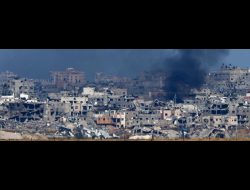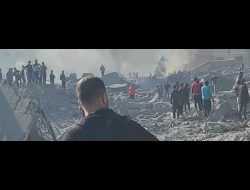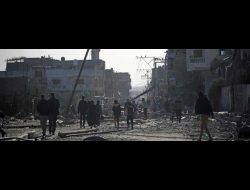Video documentation of the incident, filmed by the witness
Testimony of Muhammad 'Abdallah, 27
I work in the international department of the Communications Ministry and live with my parents and nine siblings in a-Nasser neighborhood in Gaza City. I volunteer with several youth and international organizations, including the International Solidarity Movement (ISM).
On Sunday, 20 July 2014, at around 3:30 P.M., when I heard about a temporary ceasefire to evacuate wounded people and bodies from a-Shuja'iyeh neighborhood, I went there with four foreign volunteers. We wore fluorescent yellow vests. We reached the eastern part of the neighborhood. I’m not that familiar with the area. We met Civil Defense personnel there. They were removing victims. They asked us to go to a certain area where there were casualties and told us how to get there.
We started walking and soon after, we met a young man who lived in the neighborhood. He wanted to reach his home to check on his family. He was about 20-22 years old, and wore jeans and a green shirt. He didn’t tell us is name. He asked us to help him and accompany him. He said he'd been out of the neighborhood when it was bombed and didn't know if his family had managed to leave it. He told us where the house was. As it turned out, the house was in the same area we were supposed to go to. We walked together. Suddenly I heard massive firing, maybe of shells. It sounded very close. I heard some other firing in the area, too, so I was sure there must be soldiers very close by. I didn't give it much thought because there was a "ceasefire" and there were ambulances, medical teams, journalists and local residents in the neighborhood.
We were shocked by what we saw. A-Shuja'iyeh had become a real ghost town: a city of ruins, completely destroyed. Everything was completely destroyed: houses, shops, everything. Death and destruction had replaced life, movement, hope, commerce and market life.
If you know a-Shuja'iyeh, you know there used to be a big market there that sold food, drinks, clothing and what not. People could hardly walk there, it was so crowded. The place was full of life. All I could see now was destruction, rubble, like the aftermath of a tornado. Every single house and shop had been hit by at least one shell. There were blood stains everywhere.
We walked over the rubble, calling out to see if anyone needed help, hoping we’d be able to help people. The young man who had come along with us was in shock. He was terrified and kept calling out to someone called Munir. I don't know who that is – we didn't really get a chance to ask him anything. The further we went, the greater our shock. Every few minutes, I asked the young man if we were still far from the house, and he said we were getting closer. We walked about 200-300 meters until we got there. The house had been completely demolished. He stood in the ruins, shouting and calling Munir’s name, but no one answered. Then he said to me: there's no one here, I don't know where they went, I guess they were killed.
We managed to walk just a few steps more when we heard a single gunshot. The young man fell to the ground. He had been hit in the upper leg. I shouted out to him and asked if he could move, so that he could crawl over to me. He said he couldn't. I didn’t manage to say anything else before I heard two more shots, and then the young man stopped moving. I guess it was a direct hit to his chest. I heard him recite a prayer and then I think he died. One of the foreign volunteers, Charlie from Sweden, said we had to help him. She was across the road, about ten meters away. She was with Freido, also from Sweden, and with Joe from the U.S. I told her he was dead. I was afraid that if I’d move and go over to him, I’d get shot too. I stayed put and said nothing. I didn't know what to say or do.
I've seen a lot of bodies, in this war and the previous ones, but this incident was the worst I've ever seen. It's the first time I saw a person shot in cold blood, for no reason. He was talking to me just moments before, walking with me, and suddenly he was a lifeless corpse, just lying there. I can't bear to think about it, because I'll break down and won't be able to continue working to help people in this war. To this day, every time I recall that awful sight, I try to think of something else and tell myself not to cry, because people need my help.
Rina and I and the other volunteers decided to walk on the other side of the road, over the ruins, and go back to where we came from to keep out of danger. We walked for about ten minutes, but it felt like ten years. All along the way, I saw destruction and smelled the stench of death. I saw dead animals: a dog, a horse, a donkey. A few minutes before the young man was killed, he pointed to a pigeon perched above the ruins and said: Strange, how did it survive? The pigeon was the only living thing I saw.
I felt terrible pain and sorrow and pity for the young man, because we left him there. I really wanted to get him out of the ruins, out of respect for the dead. The dead should be buried. But I knew it was very dangerous to go near, because I could become a corpse myself. I also thought that maybe we could have saved him. At first, he was only hit in the leg and I could have quickly dragged him out of there. But the sniper's bullets were faster than we were.
When we got out of the street an ambulance took us out of the area and I went home. I couldn't tell anyone about what had happened. If my family knew I'd been in a-Shuja'iyeh, they'd go crazy, especially my mother. Every time l leave the house she begs me not to, because she's afraid I'll get hurt. But I know that even if I stay at home, we could all die, like any other family in Gaza. No place is safe and no one is far from the bombardments. Anyone in Gaza can be a target. My mother is like all mothers, she wants to protect her children. But I can't stay home and not take photographs, made a record of things, and try and help the victims. I try to overcome the frustration and despair, instead of sitting at home waiting to die. I do whatever I can, even if it means risking my life.
The day before yesterday, I was at Shuhada al-Aqsa Hospital, translating for a journalist who had come to cover the bombing of the hospital that killed people inside and injured others. While we were there, five bodies were brought in, all from one family, and two wounded people were also brought in. They said they’d been hit by a bombardment as they were leaving their house in Salah a-Din Street in the Deir al-Balah area. Entire families have been killed, with no surviving members. We’ve gotten to the point that we're talking in numbers, not in names. I don't know, maybe I'll be a number on that list, too.
Muhammad 'Abdallah, 27, works in the international department of the Communications Ministry in Gaza and volunteers with the International Solidarity Movement (ISM). He lives in a-Nasser neighborhood, Gaza City. He gave his testimony by phone to Salma a-Deb'i, B'Tselem's field researcher in Nablus, on 22 July 2014.
Concerning testimonies about the "Protective Edge" campaign:
With the current military campaign ongoing, B’Tselem is taking testimony from Gaza residents, mainly by telephone. B’Tselem verifies, to the best of its ability, the reliability and precision of the information reported; nevertheless, in these circumstances, reports may be incomplete or contain errors. Given the urgency of informing the public about events in Gaza, B’Tselem has decided to publish the information now available. When the military campaign ends, B’Tselem will supplement these reports as needed.


